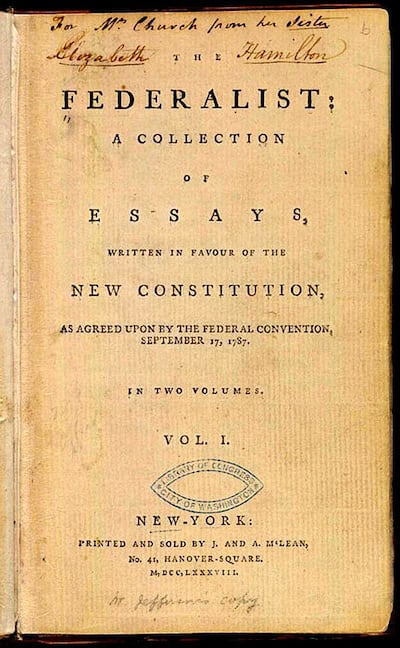In the fall of 1787, the proposed Constitution of the United States was submitted to the original 13 states for consideration. Opposition quickly arose among those who feared the plan gave too much power to the federal government. In response, the Federalist Papers were written by Alexander Hamilton, James Madison and John Jay. Over a period of six months, the trio wrote 85 newspaper columns encouraging adoption of the new Constitution.
Having long revered the Constitution and the wisdom behind it, I began the New Year with a commitment to reread the Federalist Papers one column a day for 85 days. My effort was rewarded on the very first day with a reminder of how that 18th century wisdom remains relevant in the 21st century.

Writing under the name Publius, Hamilton noted how wonderful it would be if the Constitutional debate could be conducted in an “unbiased” manner focused only on our “true interests” and the “public good.” While his language is more formal than we would use today, Hamilton’s wish sounds a lot like the heartfelt desire of 21st century voters. Sick of partisan posturing, they want Congress to put aside special interests and focus on finding practical solutions to our nation’s serious challenges.
Hamilton, however, was a realist. Such a thoughtful and fact-based discussion “is a thing more ardently to be wished for than seriously to be expected.” He recognized that politicians on both sides of any question might be motivated by “Ambition, avarice, personal animosity, party opposition, and many other motives not more laudable than these.”
To modern Americans, that sounds like the 21st century Congress. A majority of voters nationwide think it’s likely their own representative in Congress trades votes for cash. Seventy-two percent believe that most politicians use their power and influence to enrich their family and friends. Like Hamilton, today’s voters may want something better, but they have a firm grasp on reality.
Many Americans today also share Hamilton’s wish that political leaders would display a little “moderation” in their tone. Perhaps those on one side of the partisan divide could admit that not all their opponents are corrupt. Maybe “those who are ever so thoroughly persuaded of their being in the right” could acknowledge the possibility that they are sometimes wrong. Wouldn’t it be nice if politicians could just do the right thing instead of considering their own self-interest?
But Hamilton knew that was no more likely to happen in 1787 than it would be in 2020.
Instead, he expected that “a torrent of angry and malignant passions will be let loose.” While debating whether the Constitution should be adopted, Hamilton knew both sides would seek to win “converts by the loudness of their declamations and by the bitterness of their invectives.” Those 18th century partisan passions must seem very familiar to anyone who watches cable news today.
By the way, if you don’t believe things were that bad in the 18th century, Hamilton himself was killed by Aaron Burr in a duel. At the time, Burr was vice president of the United States.
To me, it’s kind of reassuring to know that the ugliness of politics today would have been no surprise to our founders. Rather than dreaming of an idyllic system ruled by angelic leaders, they sought to create a government that could work despite the realities of human nature. They succeeded by developing a brilliant system of checks and balances.
As Americans today, we are blessed to be the heirs of some amazing 18th century wisdom. Drawing upon that wisdom can point our nation to an even brighter future.
I recognize, of course, that the founders of our government were far from perfect. They had some horrific blind spots and their analysis wasn’t always on the mark (I’ll be addressing a big blooper in next week’s column). They were men, not angels. And, it should be noted, the Constitution they gave us wasn’t perfect either.
But the men who gathered to draft our Constitution gave great and careful thought to a foundational question about power and politics that remains relevant today. How can we have a government powerful enough to protect our freedom without making it so powerful that it threatens our freedom?
Their thoughts on this topic and others are a national treasure that we ignore at our peril.
I will be writing more about this in the coming weeks.
Scott Rasmussen is an American political analyst and digital media entrepreneur.


